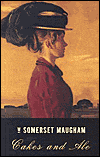Books |
Somerset Maugham: Cakes and Ale
By
Published: Sep 27, 2020
Category:
Fiction
His parents were known as "Beauty and the Beast." Once someone asked the lovely Mrs. Maugham how she remained faithful to her ugly husband. "He never hurts my feelings," she said. She was equally tender to her youngest son, William. When he was just eight years old, she died. Seventy years later, William Somerset Maugham was still saying, "I shall never get over her death. I shall never get over it."
Two years later, his father died, and Willie Maugham, who had lived so long in Paris that he spoke no English, was shipped back to relatives in the English countryside. He had a club foot. And a stammer. He wanted to be a writer; he was persuaded to go to medical school. When he was 23, he produced a novel. It was a huge success. Medicine was forgotten.
By 1930, when "Cakes and Ale" hit the bookstores, Maugham had published "Of Human Bondage" and "The Moon and Sixpence" and a book of innovative spy stories about Willie Ashenden, his alter-ego and favorite narrator. He was the highest-paid, most famous writer in the world. No mystery why — his books were chatty and easy to read. They went down smooth and whole, like oysters. Once consumed, they presented no bulk. This was deliberate; Maugham had gone to school on de Maupassant and Chekhov, practiced writing stories that had no adjectives and, with considerable sweat, forged a prose style that read like conversation. [To buy the paperback from Amazon, click here. For the Kindle edition, click here.]
Maugham was not known as a bomb-thrower, but "Cakes and Ale" in 1930 changed that. The novel was a scandal. Not for the sex. For literary reasons — it starts with a vicious portrait of "Roy Kear," a popular writer of second-rate novels clearly modeled on a then-noted English writer. The odd thing: Kear is important only for getting the story started, he couldn’t be a more minor character.
Kear, in any event, gets things going by leaving a message for Willie Ashenden, now a moderately successful, extremely observant writer. Good manners require Ashenden to accept an invitation for lunch. There, to his surprise, Kear turns the conversation to Edward Driffield, the venerable English novelist (Maugham modeled him on Thomas Hardy) who wrote so many deadly boring books over so many decades that he is regarded as a master.
It turns out that, as a boy of 15, Ashenden was befriended by Edward Driffield and his first wife, Rosie. Roy Kear is writing an adoring biography of Driffield; he’d love Ashenden to share those memories. Instead, Ashenden drifts down memory lane and tells us the story no one knows — the truth about the Driffield marriage.
Ashenden’s memories seem to be a chronicle of small-town snobbery. In the countryside where young Ashenden (and Maugham) spends school vacations, the Driffields are not respectable. Edward is a writer, thus automatically suspect. And Rosie — well, she has a past. Young Ashenden is aware of their checkered reputation, but he is hungrier for adult friendship than he is for social propriety. The Driffields become his second family — until they suddenly bolt, leaving debts and questions behind them.
Years pass. Ashenden is now a medical student in London. He runs into Rosie; their friendship resumes. But Ashenden is now twenty — he understands that although Rosie seems to love her husband, she is repeatedly unfaithful to him. And, soon enough, he becomes her lover. One of them, anyway, for Ashenden must confront an idea that few men can handle: women’s right to sexual freedom.
Roy Kear can’t. Here he is, pumping Willie Ashenden:
"I suppose she was awful."
"I don’t recollect that."
"She must have been dreadfully common. She was a barmaid, wasn’t she?"
"Yes."
"I wonder why the devil he married her. I’ve always been given to understand that she was extremely unfaithful to him."
"Extremely."
"Do you remember at all what she was like?"
"Yes, very distinctly," I smiled. "She was sweet.
Not what Kear wants to hear. Much later Ashenden spells it out for him:
"She was a very simple woman. Her instincts were healthy and ingenuous. She loved to make people happy. She loved love."
"Do you call that love?"
"Well, then, the act of love. She was naturally affectionate. When she liked anyone, it was quite natural for her to go to bed with him. She never thought twice about it. It was not vice; it wasn’t lasciviousness; it was her nature. She gave herself as naturally as the sun gives heat or the flowers their perfume. It was a pleasure to her and she liked to give pleasure to others. It had no effect on her character; she remained sincere, unspoiled, and artless."
Whew! That’s a long way from bike rides in the country, even further from lunch with Roy Kear in a London club. And although "Cakes and Ale" is a relatively short novel — it’s a crisp 300 pages — there are many more twists in it. I won’t spoil them for you.
It’s been fashionable for decades to dismiss Maugham as a mere storyteller, as if the ability to tell stories is a second-rate gift. But unless you are a snootball critic, stories are what you read fiction for. In "Cakes and Ale," Maugham juggles half a dozen characters without breaking a sweat. The novel seems formless and weightless, a tale told by a friend over drinks. You cannot imagine how hard it is to do this.
Of all his books, Maugham considered "Cakes and Ale" his favorite. Read it and you’ll see why.


